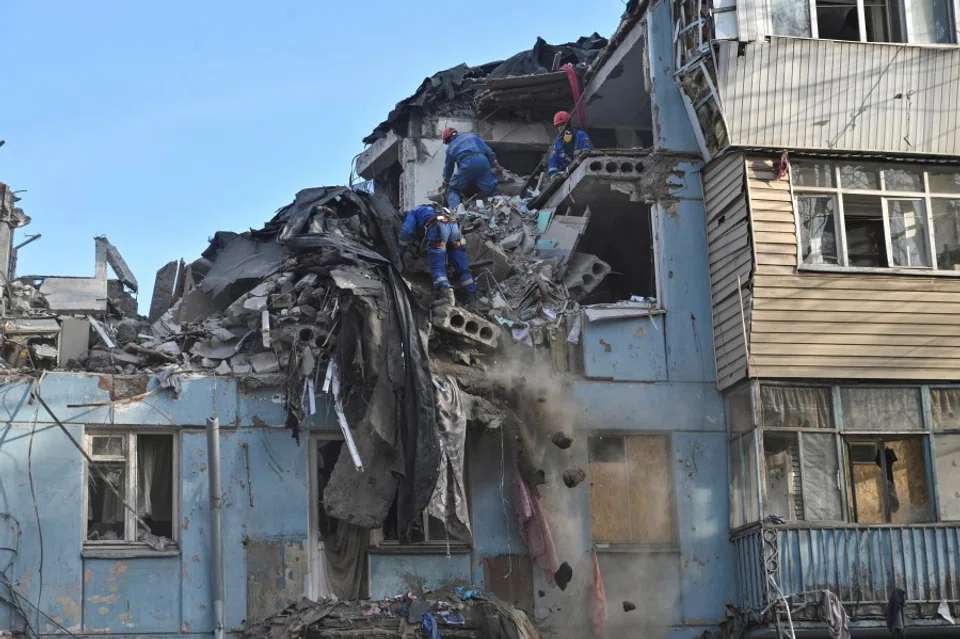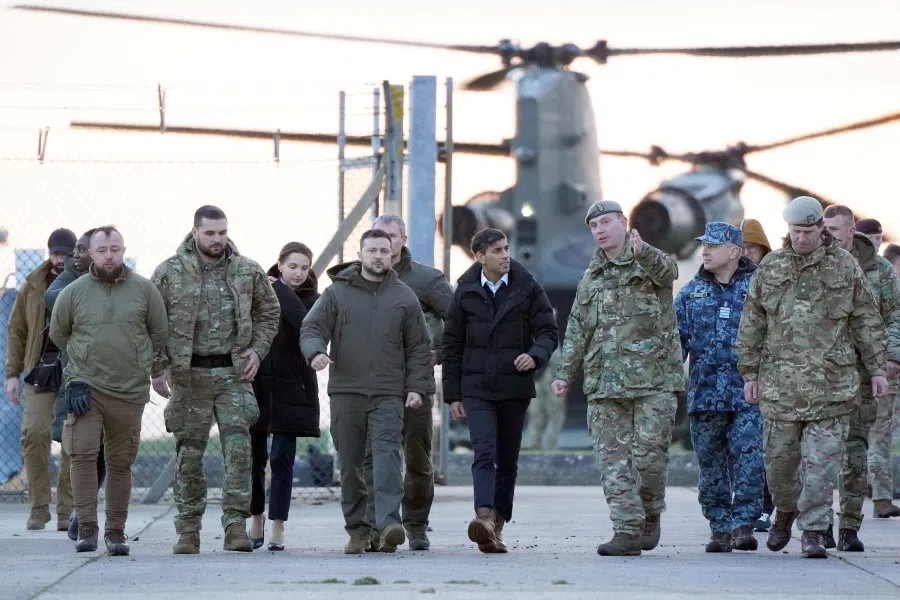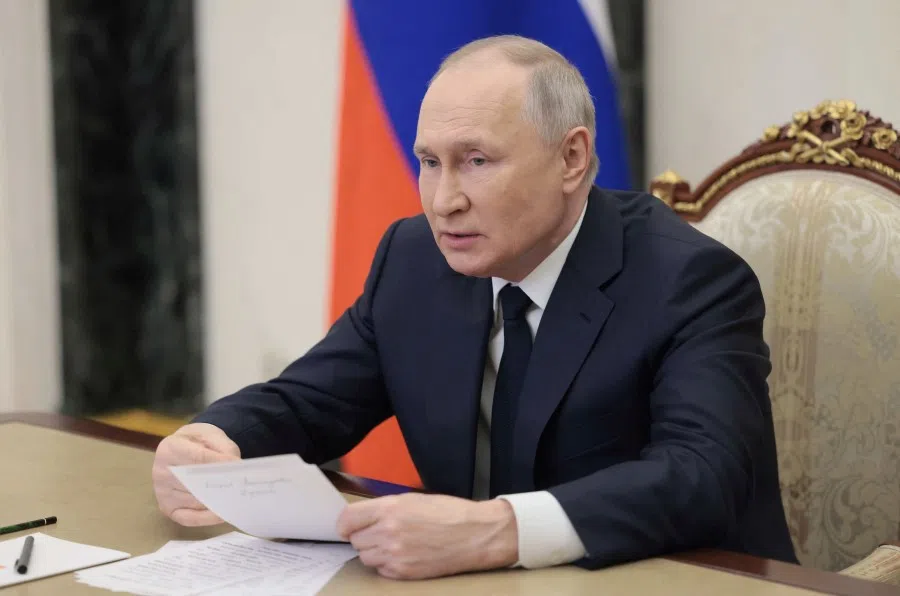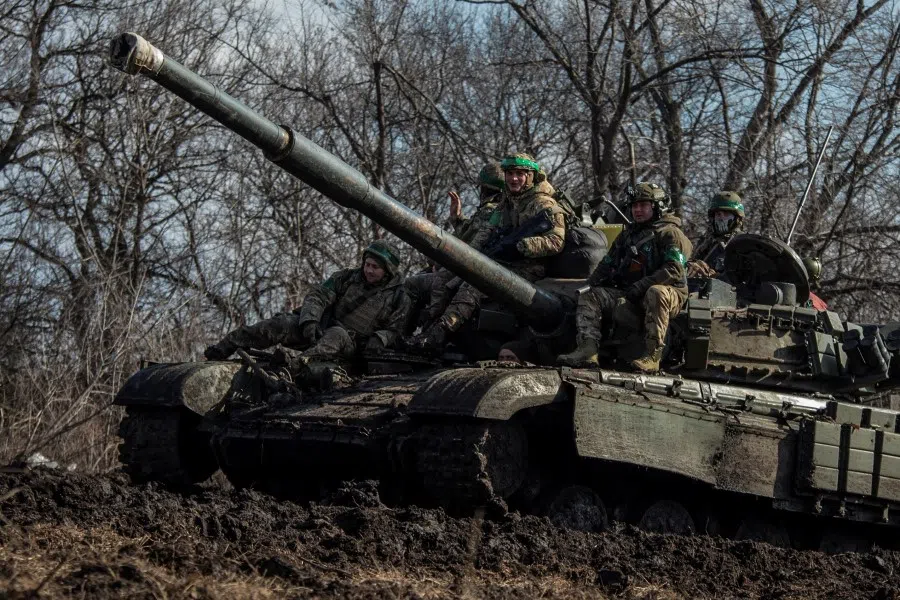Chinese academic: Lessons for China from the Russia-Ukraine war
Russia's failure in winning its war in Ukraine has been largely due to its weak soft power as well as the poor performance of its weaponry, which had initially given the country false confidence in its ability to gain a quick victory. Chinese academic Deng Qingbo tells us what China can learn from Russia's mistakes in this respect.

On 22 February, Dmitry Medvedev, deputy chair of the Security Council of the Russian Federation, said on social media that "[if] the US wants to defeat Russia, we have the right to defend ourselves with any weapon, including nuclear weapons". He added, "If the US stops supplying weapons to the Kyiv regime, the war will end."
Weakness in Russia's weaponry
Weaponry continues to hold the key in the Russia-Ukraine war. Before the war began, Russia was against Ukraine's intention to join the North Atlantic Treaty Organization (NATO) for this would result in NATO deploying advanced weapons at its doorstep. After the war started, Russia thought it could use its superior military strength to swiftly crush Ukraine.
Russia seems to have been blinded by its confidence in its weaponry, especially its mighty nuclear arsenal, which it believes would deter the US and NATO from intervening, leaving Russia invincible.
However, the US has convinced NATO to keep providing Ukraine with weapons, thus preventing Russia from quickly securing a total victory. It is also losing the initiative as the war drags on. Additionally, the performance of Russian weapons on the battlefield has fallen well short of expectations. For example, the heralded Moskva, the flagship of Russia's Black Sea Fleet, was sunk before it had made any contribution to the war. This severely dented the reputation of Russian weaponry.
... when a major power does not hesitate to flash its nuclear trump card, it either means that it is bloodthirsty or is at the end of its wits and does not have better weapons at its disposal.
A current point of interest in the Russia-Ukraine war is whether NATO members such as the US, Germany, the UK and France will provide the Zelenskyy government with even more advanced weapons. At the same time, the US continues to fuel speculations that China is mulling supplying Russia with weapons. In doing so, the US clearly wants to prevent other countries from providing Russia with weapon aid.

Faced with such circumstances, another Russian political heavyweight delivered yet a stern warning about the use of weapons. While such threats about the use of weapons, including nuclear weapons for self-defence, may appear tough, it has the counter effect of exposing the weakness in Russia's weaponry. Because, when a major power does not hesitate to flash its nuclear trump card, it either means that it is bloodthirsty or is at the end of its wits and does not have better weapons at its disposal.
As the main successor to the USSR, Russia clearly did not learn the lessons of its predecessor.
Russia's greatest tactical mistake
As a matter of fact, Russian politicians' obsession with weapons has caused them to commit the biggest error in its national strategy.
From a historical perspective, the collapse of the former United Socialist Soviet Republic (USSR) is also linked to its leaders' obsession with weaponry. In order to sustain its military might, the USSR focused on heavy industries at the expense of livelihoods. Similarly, the USSR authorities invested heavily in the development of weapons in response to the US's Strategic Defense Initiative (or so-called Star Wars programme), and this weakened the country's economy.
At the same time, the USSR failed to win the respect of the US and its European neighbours even though it held numerous military exercises and parades to showcase its fear-inducing "torrent of steel". Instead, European countries were convinced that the USSR was a powerful threat, thus worsening its strategic outlook.
Finally, it was the USSR's obsession with the superiority of its weaponry that caused it to be embroiled in the Soviet-Afghan War. All these were factors that catalysed its eventual collapse.
As the main successor to the USSR, Russia clearly did not learn the lessons of its predecessor. As a politician groomed within the Soviet system, Russian President Vladimir Putin is even more obsessed with weapons than the political leaders of the former USSR. Putin helmed a number of invasions and had tasted victory, with the sweetest being Russia's annexation of Crimea through a mere display of its military prowess. Clearly, Putin expected the same result when he ordered the invasion of Ukraine last year.

But events in the past year or so have proved that weapons alone cannot ensure Russia's invincibility. Like drugs, weapons are addictive; as political leaders become increasingly dependent on them, nations and even the entire world are endangered.
Indeed, Russia is currently stranded in the war it started. With a continuous supply of weapons to Ukraine from the US, not only is it difficult for the Russia-Ukraine war to end, it is at risk of escalating, putting the world at great risk of a nuclear war.
Russian political leaders must recognise that today's circumstances are not just a result of the US and other Western countries supplying weapons to Ukraine. There is something more important and powerful than weaponry in the world.
... the people of the USSR, including many who were members of the Communist Party of the Soviet Union (CPSU), longed for Western-style democracy, liberty and lifestyles. This caused them to lose faith and patience with the USSR's political system.
Critical role of soft power
Looking back in history at how the US and its allies overcame the USSR, it can be argued that their soft power, such as cultural exports, played a more critical role than their weapons. At the time, the people of the USSR, including many who were members of the Communist Party of the Soviet Union (CPSU), longed for Western-style democracy, liberty and lifestyles. This caused them to lose faith and patience with the USSR's political system.
In the end, they chose to overlook and to a certain extent even welcomed the collapse of their country. The people of the USSR and members of the CPSU did not fight against nor shed tears at the downfall of their nation and political party.
In a similar vein, Ukraine shares strong historical ties with Russia but decided to switch allegiance to the West because its people, or at least the elites who are in power, are fonder of Western institutions and lifestyles instead of what Russia had to offer.
Evidently, if Russia had greater soft power, or if its societal system and lifestyles were sufficiently attractive, it could have relied on such strengths to forge closer ties with the Ukrainian elites and people, thereby consolidating its strategic interests. In the absence of this option and faced with a Ukraine that was slipping away, a hand-tied Russia opted for the worst choice of invasion.

Putin holds all the levers of power in Russia and has ruled for a long time, but do Russians today enjoy greater freedom and prosperity? Is Russia a promised land that foreigners wish to move to? Do outsiders envy the lifestyles that Russians lead and are therefore willing to follow Putin's lead? Clearly not.
Russia has yet to come up with a way that allows its people to live in security and prosper, and which its neighbours aim to emulate. The state of Russia's internal affairs coupled with its obsession with weapons and a willingness to use military power will only cause its neighbours to fear and distance themselves from it, worsening its strategic environment.
China has recognised that these are the rights of its people and it falls on the ruling party to realise the vision.
China's path
So, what are some lessons that China can learn from the Russia-Ukraine war? First, while weapons are important, one must not become obsessed with them. Next, soft power is even more important than weapons. In the face of the many obstacles laid down by the US, China's greatest weakness is not that it does not have enough weapons, nor that its economy is not sufficiently developed. Rather, the question is whether its soft power, such as culture and political institutions, is strong enough for it to go head-to-head with the US.
In fact, China's massive achievements are not limited to its economic gains; even more importantly, its core values are now made up of democracy, liberty, civic-mindedness, equality, justice and the rule of law. In so doing, China has recognised that these are the rights of its people and it falls on the ruling party to realise the vision.
If China continues on this path, its people can look forward to living in a truly democratic and free society one day. When that day comes, China will no longer have to fear the West's accusations of human rights and democratic transgressions, nor fear the allure of such values to its people. At the same time, more countries and regions will naturally be drawn towards China, making it stronger and more assured. And this is why Confucius proposed that "when distant people are unsubmissive, one cultivates one's moral quality in order to attract them, and once they have come, one makes peace with them".
Of course, it is not just Russian politicians who are obsessed with weapons. The American political elites of today are arguably even more obsessed with weapons. The US's annual military expenditure is currently around 40% of the global total. This exceeds the total annual defence budgets of the next 15 countries below it and is more than ten times Russia's annual military spending.
Consequently, this has led to the US's debt crisis. Even though it is the most developed nation, many of its people live in poverty and its society is deeply divided. So, if Russia is paying the price for its obsession with weapons, one cannot help but wonder which is the next major power to founder.
This article was first published in Lianhe Zaobao as "中国从俄乌战争中该反思什么?".
Related: What a weakened Russia would mean for China | The Russia-Ukraine war and its potential impact on Russia's arms sales to Southeast Asia | Lessons from Ukraine: Russia might fall into decline by going against global sentiment | An ostracised Russia's descent into war and lessons for China | Russia-Ukraine crisis: Can Russian aggression bring back the former glory of the Soviet Union?





